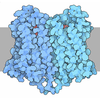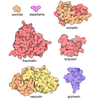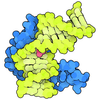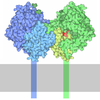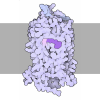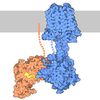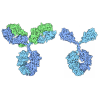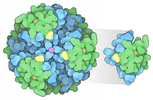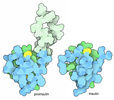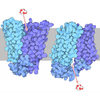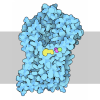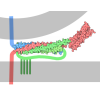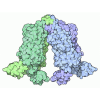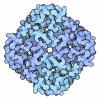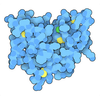+ データを開く
データを開く
- 基本情報
基本情報
| 登録情報 | データベース: PDB / ID: 9dyf | ||||||||||||
|---|---|---|---|---|---|---|---|---|---|---|---|---|---|
| タイトル | Asenapine-bound serotonin 1A (5-HT1A) receptor-Gi1 protein complex | ||||||||||||
 要素 要素 |
| ||||||||||||
 キーワード キーワード | SIGNALING PROTEIN / GPCR Signaling Complex / Serotonin Receptor | ||||||||||||
| 機能・相同性 |  機能・相同性情報 機能・相同性情報regulation of serotonin secretion / Gi/o-coupled serotonin receptor activity / regulation of hormone secretion / regulation of behavior / receptor-receptor interaction / Serotonin receptors / serotonin receptor activity / G protein-coupled serotonin receptor activity / regulation of dopamine metabolic process / serotonin receptor signaling pathway ...regulation of serotonin secretion / Gi/o-coupled serotonin receptor activity / regulation of hormone secretion / regulation of behavior / receptor-receptor interaction / Serotonin receptors / serotonin receptor activity / G protein-coupled serotonin receptor activity / regulation of dopamine metabolic process / serotonin receptor signaling pathway / neurotransmitter receptor activity / serotonin metabolic process / serotonin binding / gamma-aminobutyric acid signaling pathway / exploration behavior / G protein-coupled receptor signaling pathway, coupled to cyclic nucleotide second messenger / regulation of vasoconstriction / behavioral fear response / adenylate cyclase inhibitor activity / positive regulation of protein localization to cell cortex / T cell migration / Adenylate cyclase inhibitory pathway / D2 dopamine receptor binding / response to prostaglandin E / adenylate cyclase regulator activity / G protein-coupled serotonin receptor binding / adenylate cyclase-inhibiting serotonin receptor signaling pathway / cellular response to forskolin / regulation of mitotic spindle organization / Regulation of insulin secretion / positive regulation of cholesterol biosynthetic process / negative regulation of insulin secretion / electron transport chain / G protein-coupled receptor binding / response to peptide hormone / adenylate cyclase-inhibiting G protein-coupled receptor signaling pathway / adenylate cyclase-modulating G protein-coupled receptor signaling pathway / centriolar satellite / G-protein beta/gamma-subunit complex binding / Olfactory Signaling Pathway / Activation of the phototransduction cascade / G beta:gamma signalling through PLC beta / Presynaptic function of Kainate receptors / Thromboxane signalling through TP receptor / G protein-coupled acetylcholine receptor signaling pathway / Activation of G protein gated Potassium channels / Inhibition of voltage gated Ca2+ channels via Gbeta/gamma subunits / G-protein activation / Prostacyclin signalling through prostacyclin receptor / G beta:gamma signalling through CDC42 / Glucagon signaling in metabolic regulation / G beta:gamma signalling through BTK / Synthesis, secretion, and inactivation of Glucagon-like Peptide-1 (GLP-1) / ADP signalling through P2Y purinoceptor 12 / photoreceptor disc membrane / Sensory perception of sweet, bitter, and umami (glutamate) taste / Glucagon-type ligand receptors / Adrenaline,noradrenaline inhibits insulin secretion / Vasopressin regulates renal water homeostasis via Aquaporins / GDP binding / Glucagon-like Peptide-1 (GLP1) regulates insulin secretion / G alpha (z) signalling events / cellular response to catecholamine stimulus / ADORA2B mediated anti-inflammatory cytokines production / ADP signalling through P2Y purinoceptor 1 / G beta:gamma signalling through PI3Kgamma / adenylate cyclase-activating dopamine receptor signaling pathway / Cooperation of PDCL (PhLP1) and TRiC/CCT in G-protein beta folding / GPER1 signaling / Inactivation, recovery and regulation of the phototransduction cascade / cellular response to prostaglandin E stimulus / G-protein beta-subunit binding / heterotrimeric G-protein complex / G alpha (12/13) signalling events / sensory perception of taste / extracellular vesicle / signaling receptor complex adaptor activity / Thrombin signalling through proteinase activated receptors (PARs) / retina development in camera-type eye / G protein activity / GTPase binding / Ca2+ pathway / fibroblast proliferation / midbody / High laminar flow shear stress activates signaling by PIEZO1 and PECAM1:CDH5:KDR in endothelial cells / cell cortex / G alpha (i) signalling events / G alpha (s) signalling events / phospholipase C-activating G protein-coupled receptor signaling pathway / G alpha (q) signalling events / chemical synaptic transmission / 加水分解酵素; 酸無水物に作用; GTPに作用・細胞または細胞小器官の運動に関与 / Ras protein signal transduction / periplasmic space / electron transfer activity / Extra-nuclear estrogen signaling / cell population proliferation / ciliary basal body / G protein-coupled receptor signaling pathway / iron ion binding 類似検索 - 分子機能 | ||||||||||||
| 生物種 |  Homo sapiens (ヒト) Homo sapiens (ヒト) | ||||||||||||
| 手法 | 電子顕微鏡法 / 単粒子再構成法 / クライオ電子顕微鏡法 / 解像度: 2.74 Å | ||||||||||||
 データ登録者 データ登録者 | Warren, A.L. / Zilberg, G. / Wacker, D. | ||||||||||||
| 資金援助 |  米国, 3件 米国, 3件
| ||||||||||||
 引用 引用 |  ジャーナル: Sci Adv / 年: 2025 ジャーナル: Sci Adv / 年: 2025タイトル: Structural determinants of G protein subtype selectivity at the serotonin receptor 5-HT1A. 著者: Audrey L Warren / Gregory Zilberg / Anwar Abbassi / Alejandro Abraham / Shifan Yang / Daniel Wacker /  要旨: Activation of the serotonin receptor 5-HT1A has been shown to regulate mood and cognition, making 5-HT1A an important target in the treatment of anxiety, depression, and psychosis. Although the ...Activation of the serotonin receptor 5-HT1A has been shown to regulate mood and cognition, making 5-HT1A an important target in the treatment of anxiety, depression, and psychosis. Although the receptor signals through inhibitory G proteins, more work is necessary to understand differences in transducer coupling and its relation to functional activity. To develop a molecular understanding of the differences underlying transducer coupling and activation, we performed structure-activity relationship studies of 5-HT1A with distinct G proteins. Through a combination of in vitro assays, we identified a potent partial agonist that selectively engages a G protein subtype. We further investigated the differences in G protein engagement at 5-HT1A with cryo-electron microscopy, determining structures of 5-HT1A bound to distinct ligands and G protein subtypes. Combined with subsequent structure-guided mutagenesis and signaling assays, our studies uncover both orthosteric and allosteric determinants of agonist-specific stimulation of distinct transducers. | ||||||||||||
| 履歴 |
|
- 構造の表示
構造の表示
| 構造ビューア | 分子:  Molmil Molmil Jmol/JSmol Jmol/JSmol |
|---|
- ダウンロードとリンク
ダウンロードとリンク
- ダウンロード
ダウンロード
| PDBx/mmCIF形式 |  9dyf.cif.gz 9dyf.cif.gz | 189.3 KB | 表示 |  PDBx/mmCIF形式 PDBx/mmCIF形式 |
|---|---|---|---|---|
| PDB形式 |  pdb9dyf.ent.gz pdb9dyf.ent.gz | 表示 |  PDB形式 PDB形式 | |
| PDBx/mmJSON形式 |  9dyf.json.gz 9dyf.json.gz | ツリー表示 |  PDBx/mmJSON形式 PDBx/mmJSON形式 | |
| その他 |  その他のダウンロード その他のダウンロード |
-検証レポート
| アーカイブディレクトリ |  https://data.pdbj.org/pub/pdb/validation_reports/dy/9dyf https://data.pdbj.org/pub/pdb/validation_reports/dy/9dyf ftp://data.pdbj.org/pub/pdb/validation_reports/dy/9dyf ftp://data.pdbj.org/pub/pdb/validation_reports/dy/9dyf | HTTPS FTP |
|---|
-関連構造データ
- リンク
リンク
- 集合体
集合体
| 登録構造単位 | 
|
|---|---|
| 1 |
|
- 要素
要素
-Guanine nucleotide-binding protein ... , 3種, 3分子 ABG
| #1: タンパク質 | 分子量: 40414.047 Da / 分子数: 1 / 変異: 4 / 由来タイプ: 組換発現 / 由来: (組換発現)  Homo sapiens (ヒト) / 遺伝子: GNAI1 Homo sapiens (ヒト) / 遺伝子: GNAI1発現宿主:  参照: UniProt: P63096 |
|---|---|
| #2: タンパク質 | 分子量: 39418.086 Da / 分子数: 1 / 由来タイプ: 組換発現 / 由来: (組換発現)  Homo sapiens (ヒト) / 遺伝子: GNB1 Homo sapiens (ヒト) / 遺伝子: GNB1発現宿主:  参照: UniProt: P62873 |
| #3: タンパク質 | 分子量: 7861.143 Da / 分子数: 1 / 由来タイプ: 組換発現 / 由来: (組換発現)  Homo sapiens (ヒト) / 遺伝子: GNG2 Homo sapiens (ヒト) / 遺伝子: GNG2発現宿主:  参照: UniProt: P59768 |
-タンパク質 , 1種, 1分子 R
| #4: タンパク質 | 分子量: 61375.930 Da / 分子数: 1 / Fragment: residues 1-25 of the 5-HT receptor deleted / 変異: L125W / 由来タイプ: 組換発現 由来: (組換発現)   Homo sapiens (ヒト) Homo sapiens (ヒト)遺伝子: cybC, HTR1A, ADRB2RL1, ADRBRL1 発現宿主:  参照: UniProt: P0ABE7, UniProt: P08908 |
|---|
-非ポリマー , 3種, 5分子 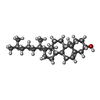
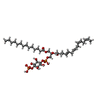

| #5: 化合物 | ChemComp-A1BIR / ( 分子量: 285.768 Da / 分子数: 1 / 由来タイプ: 合成 / 式: C17H16ClNO / タイプ: SUBJECT OF INVESTIGATION | ||
|---|---|---|---|
| #6: 化合物 | | #7: 化合物 | ChemComp-J40 / [( | |
-詳細
| 研究の焦点であるリガンドがあるか | Y |
|---|---|
| Has protein modification | Y |
-実験情報
-実験
| 実験 | 手法: 電子顕微鏡法 |
|---|---|
| EM実験 | 試料の集合状態: PARTICLE / 3次元再構成法: 単粒子再構成法 |
- 試料調製
試料調製
| 構成要素 |
| ||||||||||||||||||||||||||||
|---|---|---|---|---|---|---|---|---|---|---|---|---|---|---|---|---|---|---|---|---|---|---|---|---|---|---|---|---|---|
| 分子量 | 実験値: NO | ||||||||||||||||||||||||||||
| 由来(天然) |
| ||||||||||||||||||||||||||||
| 由来(組換発現) |
| ||||||||||||||||||||||||||||
| 緩衝液 | pH: 7.4 | ||||||||||||||||||||||||||||
| 緩衝液成分 |
| ||||||||||||||||||||||||||||
| 試料 | 包埋: NO / シャドウイング: NO / 染色: NO / 凍結: YES 詳細: Sample was mono disperse following gel filtration. The sample was immediately concentrated for CryoEM grid preparation. | ||||||||||||||||||||||||||||
| 試料支持 | グリッドの材料: COPPER / グリッドのサイズ: 300 divisions/in. / グリッドのタイプ: Quantifoil | ||||||||||||||||||||||||||||
| 急速凍結 | 装置: LEICA EM GP / 凍結剤: ETHANE 詳細: Blot force 3 for 3-5 seconds was used and subsequent grids were screened for ice thickness prior to data collection. |
- 電子顕微鏡撮影
電子顕微鏡撮影
| 実験機器 |  モデル: Titan Krios / 画像提供: FEI Company |
|---|---|
| 顕微鏡 | モデル: FEI TITAN KRIOS |
| 電子銃 | 電子線源:  FIELD EMISSION GUN / 加速電圧: 300 kV / 照射モード: FLOOD BEAM FIELD EMISSION GUN / 加速電圧: 300 kV / 照射モード: FLOOD BEAM |
| 電子レンズ | モード: BRIGHT FIELD / 倍率(公称値): 81000 X / 最大 デフォーカス(公称値): 1800 nm / 最小 デフォーカス(公称値): 500 nm |
| 撮影 | 電子線照射量: 64.03 e/Å2 / フィルム・検出器のモデル: GATAN K3 (6k x 4k) / 実像数: 4197 |
- 解析
解析
| EMソフトウェア |
| ||||||||||||||||||||||||||||||||
|---|---|---|---|---|---|---|---|---|---|---|---|---|---|---|---|---|---|---|---|---|---|---|---|---|---|---|---|---|---|---|---|---|---|
| CTF補正 | タイプ: PHASE FLIPPING AND AMPLITUDE CORRECTION | ||||||||||||||||||||||||||||||||
| 粒子像の選択 | 選択した粒子像数: 8183793 | ||||||||||||||||||||||||||||||||
| 3次元再構成 | 解像度: 2.74 Å / 解像度の算出法: FSC 0.143 CUT-OFF / 粒子像の数: 666873 / クラス平均像の数: 1 / 対称性のタイプ: POINT |
 ムービー
ムービー コントローラー
コントローラー










 PDBj
PDBj
